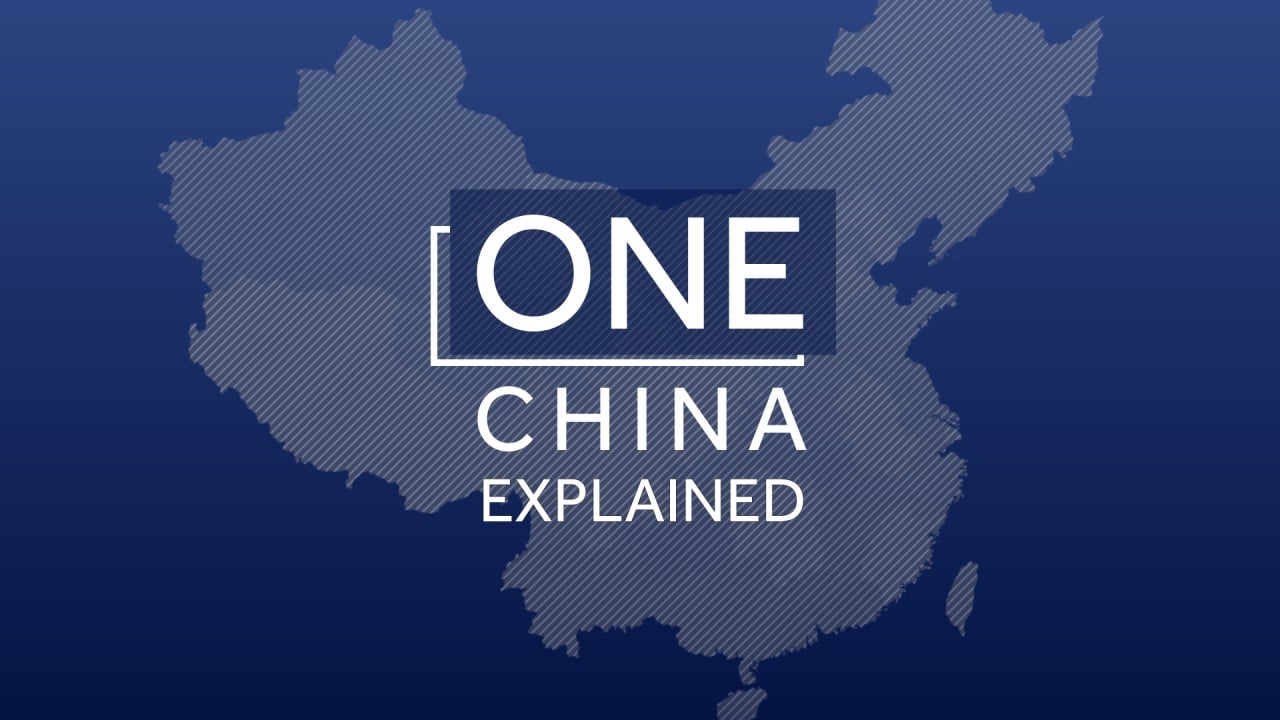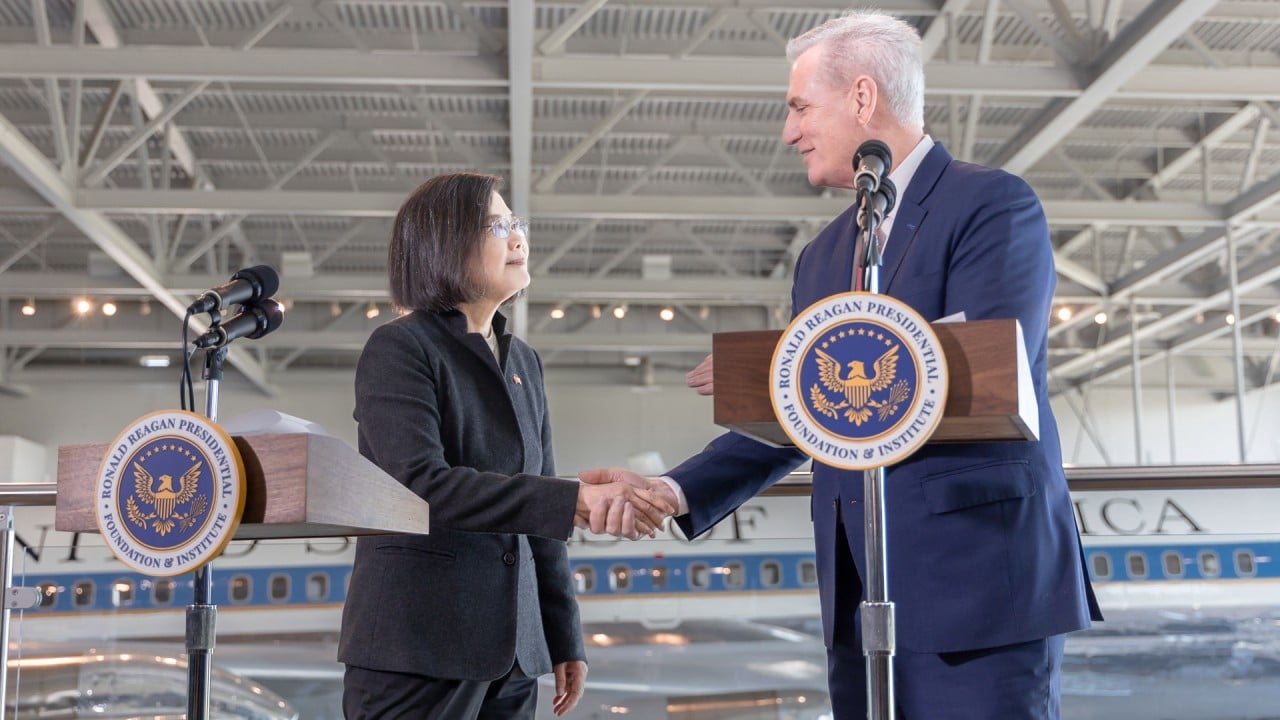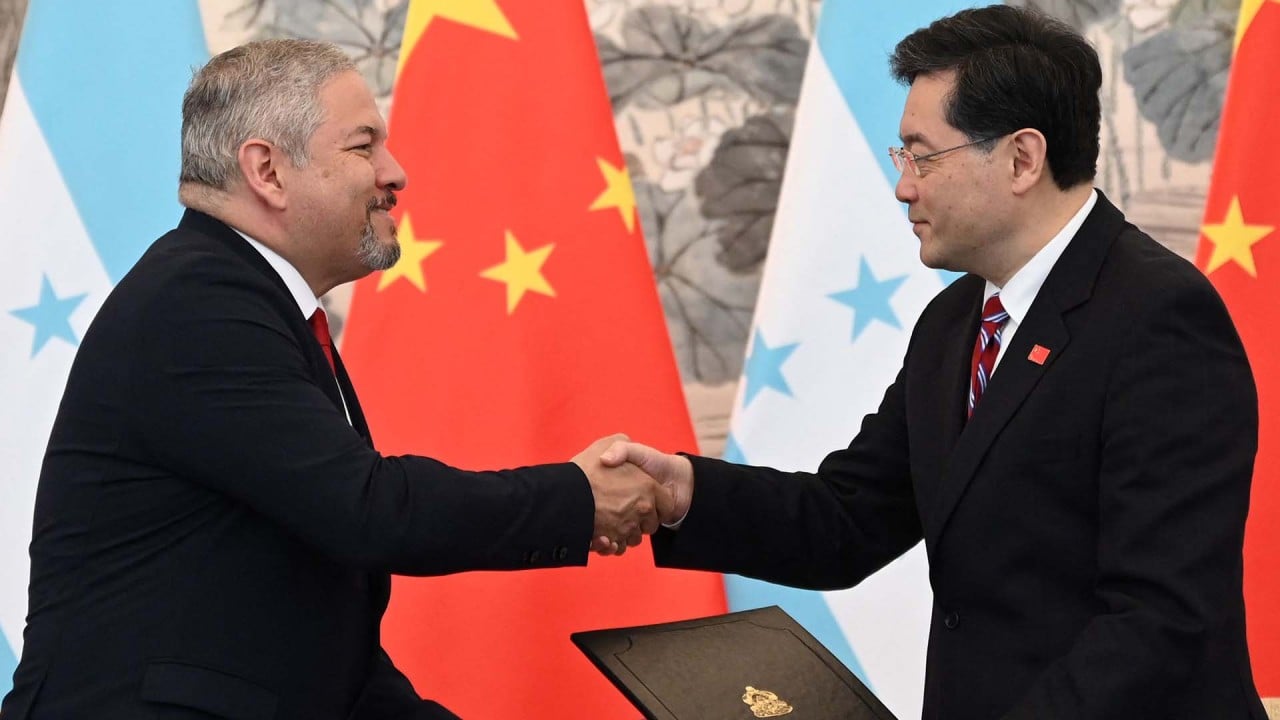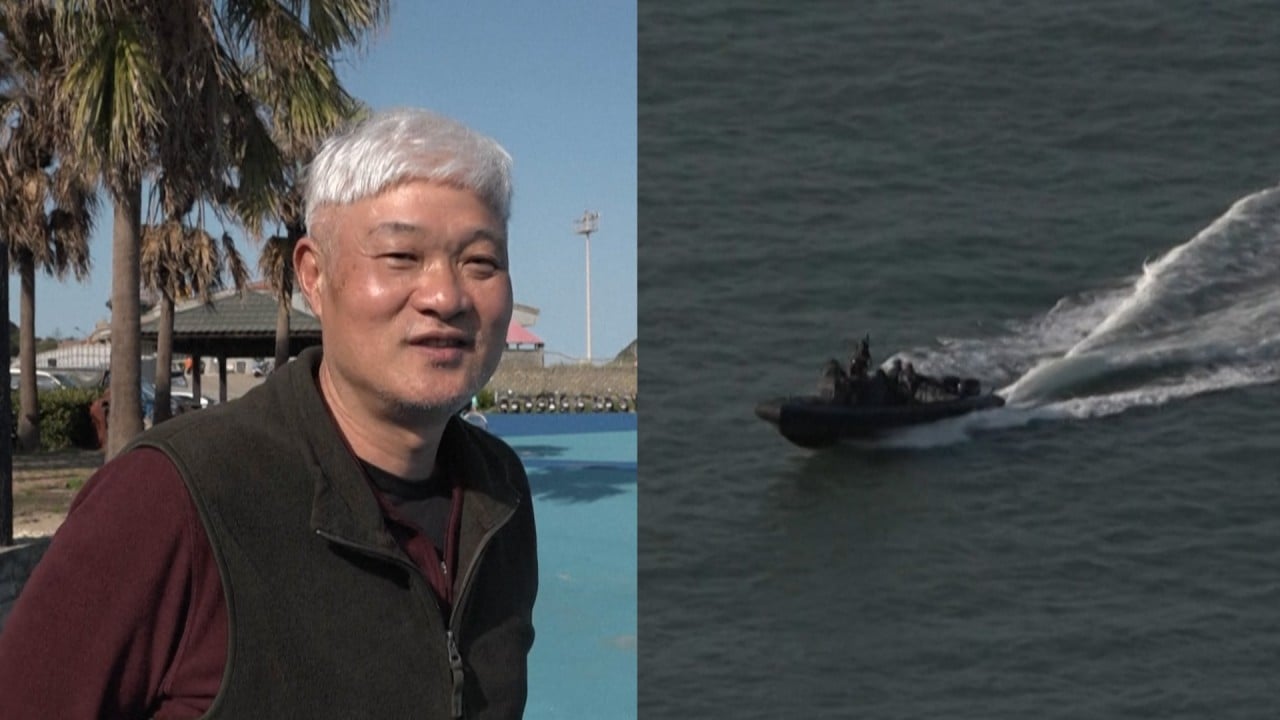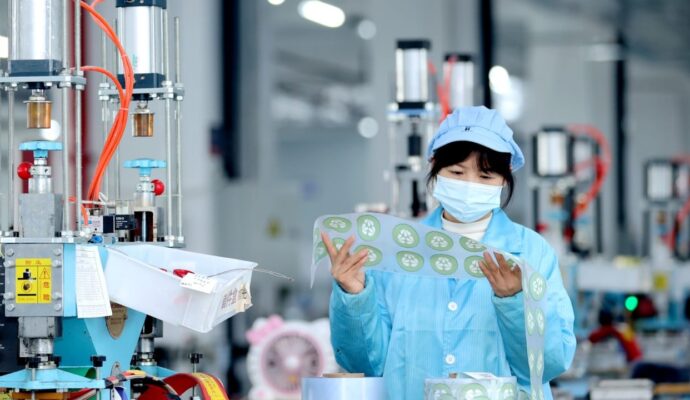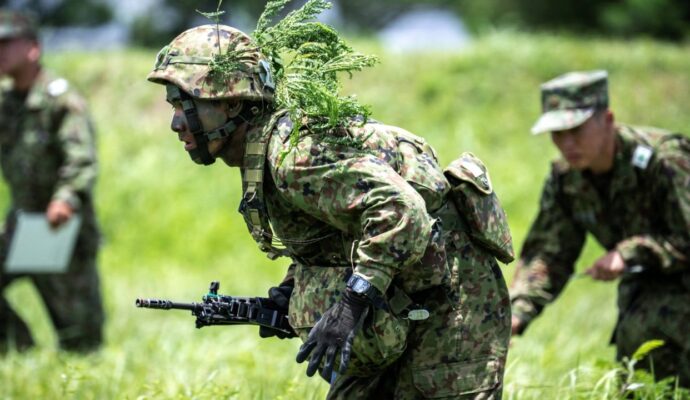A survey released by the DPP-leaning Taiwan Public Opinion Foundation on April 18 put Lai’s approval rating at 33.4 per cent, with the opposition KMT’s best-known potential challenger on 29.7 per cent.
If he wins in January, Lai is expected to retain the incumbent Tsai Ing-wen’s policies towards Beijing and Washington, a prospect that could increase the risks of conflict in the Taiwan Strait, experts believe.
Taiwanese vice-president William Lai Ching-te speaks at the launch of his presidential election campaign on April 12. Photo: CNA
The stakes are higher than ever, with geopolitical tensions escalating around Taiwan, which Beijing regards as part of its territory, to be brought under mainland control by force, if necessary.
Beijing is growing increasingly impatient at the lack of progress towards “peaceful reunification”, while Washington has stepped up its military support for Taipei and is pushing for the island to be given a higher international standing.
Most countries, including the US, do not recognise Taiwan as an independent state, but Washington is opposed to any attempt to take the island by force.
Lai’s nomination for the presidential race came days after the PLA ended its military drills near the island, in response to Tsai’s meeting with US House Speaker Kevin McCarthy in California.
The mainland view
Lai’s political experience was forged in the southern DPP stronghold of Tainan, where sentiment leans towards independence. He has long been regarded as “deep green” – a reference to the more radical, pro-independence leanings within the party.
As mayor, he travelled to the mainland – which he called “China” – in 2014, where he also said “Taiwan independence enjoys consensus” on the island and raised sensitive topics, including the bloody Tiananmen Square crackdown in 1989.
When he was appointed premier in 2017, Lai described himself as “a pragmatic worker for Taiwan independence”.
The leadership on the mainland has called Lai a “stubborn” force for Taiwanese independence – a red line for Beijing – and warned that he is playing with fire.
But Lai has occasionally signalled that his intention is not to provoke Beijing and analysts said he would be trying to get rid of his hardcore independence-leaning label in the months leading to the election.
Mainland DPP expert Lin Jin from Xiamen University said Lai is now “seeking to be well-balanced and avoid radical remarks”.
“He must turn towards being more pragmatic to win the middle voters which are key to winning,” he said.
Since becoming DPP chairman in January, Lai has vowed to follow Tsai’s cross-strait policy of maintaining the status quo, while moderating the party’s confrontational tone that was seen as contributing to its failure in last year’s local elections.
Lai’s declaration during his campaign announcement speech that “Taiwan … is already an independent and sovereign nation and therefore there is no need to declare independence” was aimed at reassuring Beijing and Washington, observers said.
Shao Zonghai, a former professor with the Chinese Cultural University of Taiwan, said Lai intended to signal that he would keep the status quo if his presidential bid is successful.
“Lai was trying to tell Beijing that we would not pursue de jure independence … and he was also trying please the US and not let supporters [there] feel concerned about possible changes of policies,” he said.
Tsai, known for her cautious approach, won the presidency in 2016 on a similar pledge, carefully navigating relations with Beijing and Washington, to reassure the US while leaving space for exchanges with the mainland.
But Beijing lost patience as Tsai’s position grew more confrontational. She refused to endorse the one-China principle – that agrees there is one China but leaves open the question of what that means – and developed closer ties with the US.
Mainland analysts believe Lai would not dare to go as far as declaring independence – a move that would trigger military action by Beijing – but his deeply rooted stance could bring more uncertainties to the strait, they said.
“Lai would basically maintain the current cross-strait policies, but it is possible that he would stress more elements of Taiwan independence if he was elected,” said Zhu Songling, a Taiwan affairs specialist at Beijing Union University.
“The DPP has continued to challenge the bottom lines, [Beijing] is becoming less tolerant now, it is also possible that there will be higher risks, even a war in the Taiwan Strait could break out,” he said.
According to Yu Xintian, a Taiwan affairs specialist with the Shanghai Institutes for International Studies, Lai has yet to fully win Washington’s trust.
Yu recalled the lesson of former Taiwanese president Chen Shui-bian, who was regarded as a “troublemaker” by the George W. Bush administration because of his radical pro-independence moves – including a proposed referendum seeking a legal declaration.
“Now [Lai] proposes to seek peace to protect Taiwan, but how to achieve peace? I believe DPP could not give the correct answer. On the contrary, he would stimulate cross-strait tensions,” Yu said.
Political science and international relations professor Zhu Zhiqun from Bucknell University in the US, also predicted a Lai presidency would be likely to carry on Tsai’s policies.
But he noted that the differences in style between Tsai and her potential successor could cause problems.
“Compared with Tsai who tends to be subtle, Lai is a more ardent and vocal supporter of Taiwan independence,” Zhu said. “Taiwan independence is absolutely not acceptable to Beijing. So it is expected that Lai’s relationship with Beijing will be extremely difficult.”
While the US will not comment publicly on the Taiwanese elections, Zhu said it was hard to imagine Washington would regard Lai as a reassuring candidate in terms of maintaining cross-strait peace.
For many Taiwanese voters, the election will be a choice between “war and peace”, he said.
Chang Yu-shau, deputy secretary-general of Taipei think tank the Cross-Strait Policy Association, said Lai is expected to adjust his personal position on Taiwan independence and follow Tsai’s cross-strait and US policies.
Chang, a former deputy chief of the DPP’s China affairs department, said Tsai’s cross-strait policy could be summed up as the “four commitments”.
These were outlined by the president in a 2021 speech as a commitment to democracy, self-determination, a resistance to annexation or encroachment, and that Taiwan and the mainland “should not be subordinate to each other”.
Chang said the commitments “are moderate appeals and also [form] an important theory that helps boost Taiwan-US relations”.
“Regardless of the changes in either the Republican or the Democrat administrations, such a theory is not only acceptable to the two parties, but also appreciated by the US, especially when the anti-China sentiment in the US has been growing non-stop,” he said.
Dealing with Washington
Nine months ahead of the election and with the KMT candidate still not confirmed, some analysts say it is too early to judge how Lai would handle Taipei’s mainland policies.
But he recently pledged to work with like-minded governments to promote democracy on the island – a promise that will certainly unnerve Beijing.
Lai has also called on Taipei to sign international trade and investment agreements and actively join global supply chains, as well as develop its defences to counter Beijing’s aggression.
These efforts show Lai’s clear intention to increase Taipei’s reliance on the US, while Washington confronts Beijing on multiple fronts, from military and economic to ideological, analysts said.
But Lai must also convince the public that he is not siding with the US unconditionally. As premier in 2019, he said in an interview that the island’s fate should be decided by its 23 million people – “not anyone else, [not] even the president, nor the president of the United States, nor the president of China.”
Unlike Tsai – who spent more than a decade negotiating Taipei’s entry to the World Trade Organization in the 1990s – Lai has limited experience in foreign relations. In recent months, he has been strengthening his diplomatic credentials in meetings with delegations from the US, Europe and Japan.
The biggest challenge for the island remains the tensions between Beijing and Washington, which have further escalated in the past year.
Xi has warned the US not to cross its red lines on the issue, while the Joe Biden administration appears to be walking away from Washington’s historic strategic ambiguity over whether it would come to Taiwan’s aid if it was attacked.
Biden has previously indicated that the US would support the island militarily – though his remarks were walked back by the White House – and his administration approved at least eight arms sales to Taipei in 2022.
The US is also in talks with Taipei over a possible trade agreement and given its support to Taiwanese participation in international bodies.
Beijing has responded by increasing its military pressure on the island and punishing Taipei with economic and diplomatic measures – persuading the island’s allies to switch official recognition in a bid to further isolate the Taiwanese government.
Li Peng, dean of Xiamen University’s Taiwan Research Institute, said Lai “knows clearly in his heart that 2024 will be a choice between war and peace”.
“But the question is, [what if] he lacks the minimum confidence for peace and [has] no capability in response to war,” Li said.
The local angle
Lai – who trained as a doctor before starting his “unexpected journey” into politics in 1996, built a reputation for good governance and pragmatic problem solving in Tainan. He is regarded as a good campaigner who rarely lost in local elections.
Unlike Tsai – who was not fluent in Taiwanese at the start of her campaign for the presidency – Lai often mixes Mandarin with the local language in his speeches, which helps voters to regard him as a local, as well as a more “typical DPP” politician.
In a Taiwanese media interview, Lai said he takes pride in his record for problem solving in the business community.
“I used to be a doctor. When we face patients and every disease, we must take action … During my tenure as premier, I didn’t listen to the difficulties they faced. I was solving problems,” he said.
Additional reporting by Lawrence Chung
